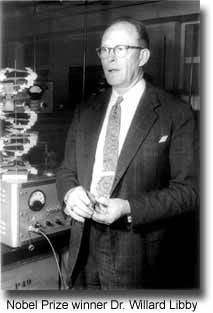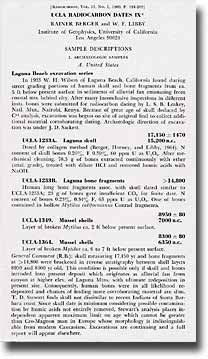 Dr.
Willard Libby, Dean of the UCLA Geophysics Lab was awarded
The Nobel Prize in Chemistry 1960. "for his method to use
carbon-14 for age determination in archaeology, geology, geophysics,
and other branches of science".
Dr.
Willard Libby, Dean of the UCLA Geophysics Lab was awarded
The Nobel Prize in Chemistry 1960. "for his method to use
carbon-14 for age determination in archaeology, geology, geophysics,
and other branches of science".
The Laguna skull was brought to him by Dr. Louis Leakey and
Dr. Rainer Burger, the head of Anthropology Department at
UCLA. Together the three scientists applied the most rigorous
testing possible to the Laguna Skull to determine once and
for all it's actual age.
Anything that lives on earth breaths. You do, I do, a
bacteria does. The air contains many elements that become
part of a living organism as it breaths. including a large
amount of the stable element Carbon 12 (C-12), with a small
percentage of the unstable isotope Carbon 14 (C-14). All during
our lives we take in the same proportion of C-12
to C-14, but when you die, no more C-14 is taken in,
and it begins to slowly decay
over time into the stable isotope C-12.
It takes about 60,000 years for all of the C-14
to decay into C-12. By
measuring the amount of C-14
left in the bones or in other organic materials, scientists
can calculate how long the organism has been dead. Carbon-14
dating has become the most sensitive and reliable method for
dating recent archaeological finds, and today it is the standard
tool used by research labs worldwide.
Working carefully and deliberately, the three scientists
ran their sensitive tests for many days at the UCLA Geophysics
Lab. About 20 percent of the skull would have to be crushed
up and burned for a testing sample, so the area at the back
of the skull was chosen to leave as much of the skull intact
as possible for future study. The entire small leg bone fragment
found along with skull was destroyed for testing also, but
the results were worth the loss.
The results finally confirmed what many
had suspected. The skull was old... very old.
 |
|
Read the official RadioCarbon report!
Click on image for full-size
|
At 17,000 years old, they were the oldest
human remains ever found in the entire Western Hemisphere.
Nearly twice as old as anything previously known. The Laguna
Skull is the FIRST American!
At the same time, a number of sensitive and precise measurements
of the skull's various morphological features made by Dr.
Berger also changed how the world thought of the skull. Using
very precise measurements, the sex of the skull could be positively
stated.
Dr. Berger also now announced to the world
that the skull was not "Laguna Man" as everyone
had thought, but "Laguna Woman"!
At last, scientists had the truth, and it rocked the world
of Anthropology. Entire careers had rested upon theories of
when people had first entered the New World, and now most
of those theories crumbled.
The generally accepted theory was that early man had entered
the Americas by walking across a land bridge between Asia
and the American continent that was exposed when the sea level
fell when much of the water in the oceans were locked up in
the great glaciers that covered the land during the last ice
age. This land bridge was formed across what is now the Bering
Straits. According to the best physical evidence at that time,
the date of mans' entrance into the Americas was around 9,000
to 10,000 years ago.
Elaborate and well reasoned theories supporting this belief
fell with a resounding crash. Here before them was proof that
the migration ( if it actually happened the way scientists
imagined ) had occurred much earlier then any one thought
possible. Twice as early!
But even more astounding,
the Laguna Woman is probably far older then this official
date.
The many years of human handling had added much "fresh"
C14 to the skull.
The "younger" seashells imbedded in the bone, along
with recent organic material and minerals that had leeched
into the skull all conspired to make the skull date younger
then it actually was.
Dr. Louis Leakey was convinced that if the skull had not
been so contaminated with fresh C14,
that it's actual age would have proved to be between 30 to
40,000 years old! Stunning!
This startling news set off intense archeological interest
in looking for more bone fragments that might still be in
the same area where the skull was found so many years ago
on St. Anns Street.
Now the hunt was on again!